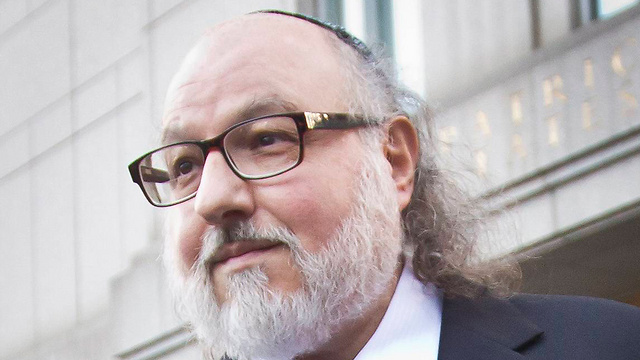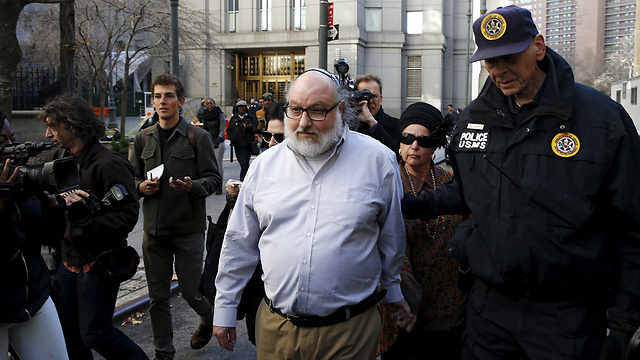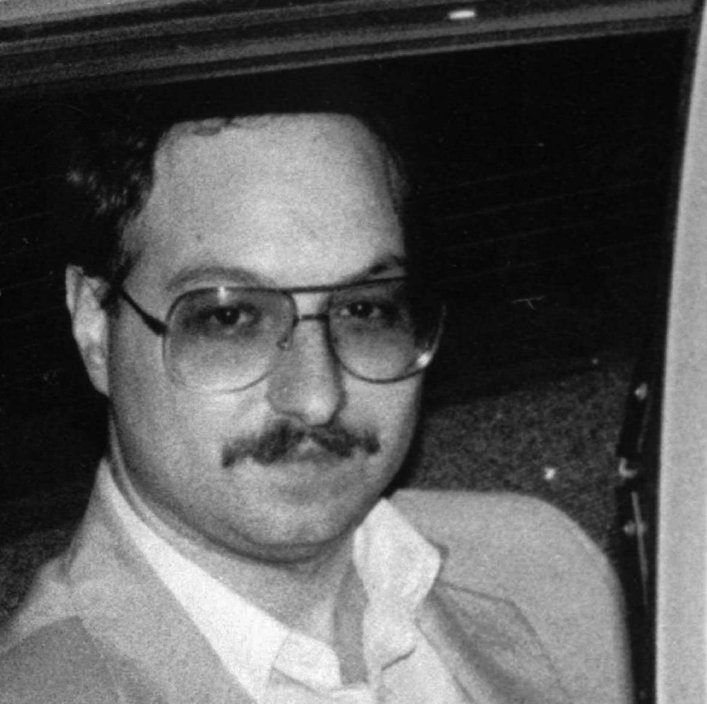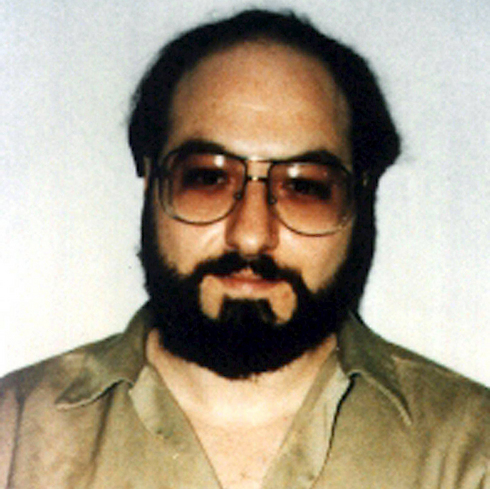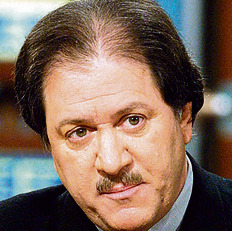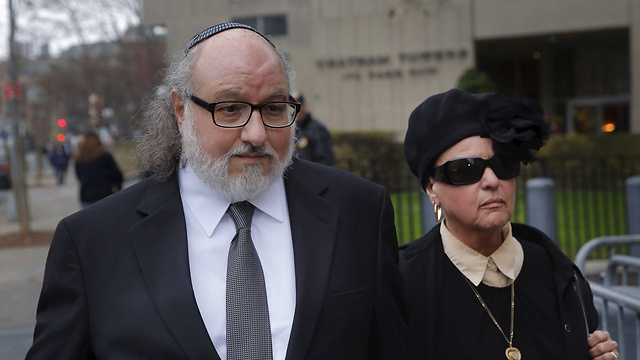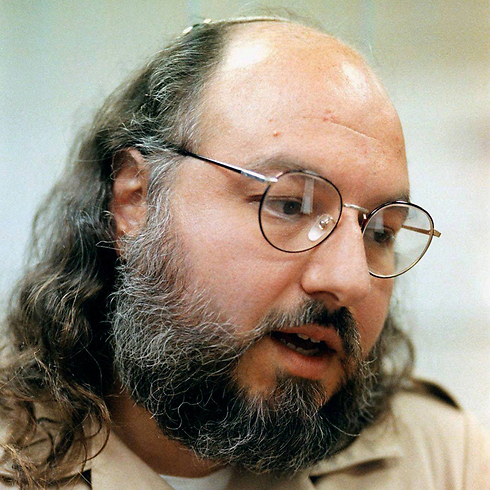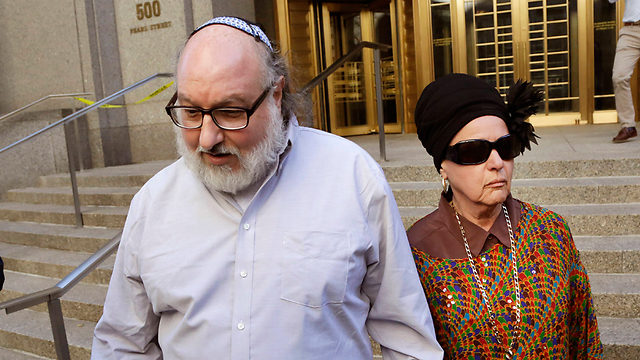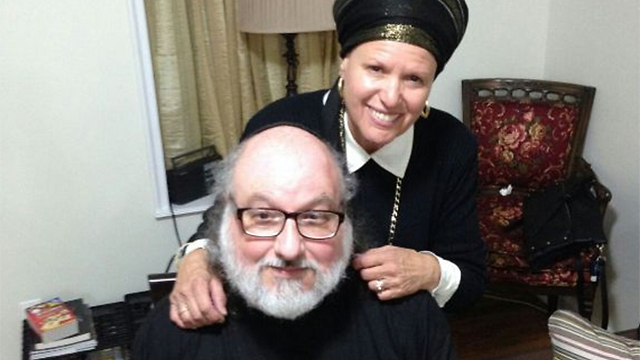

Under close watch: Jonathan Pollard's life out of prison
Since his release from prison, the former Israeli spy has been spending his time in court fighting the restrictive probation conditions that prevent him from finding employment or attending morning and evening prayers at the synagogue. Close friends say Jonathan and his wife Esther are dreaming of making aliyah and living in a moshav in southern Israel, but he is barred from leaving the US for another four years.
NEW YORK - Several weeks ago, Esther Pollard arrived on a visit to Israel with her heart full of hope. A US district court was about to rule on a request made by her husband—former Israeli spy Jonathan Pollard—to ease the terms of his parole after serving 30 years in prison. The couple dreamed of leaving the United States and immigrating to Israel, where they would buy a small house in a moshav in the north and live out the rest of their lives in complete anonymity.
But then they had to face reality when, in early August, the judge rejected Pollad's challenge to his restrictive probation conditions, and now the couple doesn't know if their dream of retiring to the Holy Land would come true in the foreseeable future. The way things are at the moment, 10 months after Pollard's release from prison, the US government has very little incentive to make Jonathan Pollard's life any easier. Whether it's vengeance and pettiness or a legitimate concern—it depends on whom you ask.
After 30 years in prison and almost a year until heavy restrictions—this is how Jonathan Pollard's new life looks like.
'They keep abusing him'
When the gates of the federal prison in North Carolina opened late one night last November to let Jonathan Pollard out, he knew there was going to be a surge of media interest in him for a short period of time, and that it would take him a while to get used to simple things like crossing the street when the light turns green.
His life was not exactly normal even before he was caught, charged and convicted of comitting espionage and leaking classified information, and he knew life was not exactly going to be normal when he left prison. He did hope to carve out some semblance of a normal life for him and his wife, but quickly learned that would be impossible and that the country of his birth was not quick to forget—and was very rarely wont to forgive.
Since his release, Jonathan and Esther Pollard have been living in a small one-room apartment in central Manhattan—on the fifth floor, with no elevator. Pollard's day begins at 7am and ends at 7pm, because of the 12-hour curfew imposed on him as part of his parole. He could walk freely on the streets of Manhattan, but cannot leave its borders—not even to Brooklyn, where the religious Jewish community is centered and where his main social circle are. Another result of his curfew is that he cannot attend morning or evening prayers at the synagogue.
Pollard also can't attend prayers on Saturday morning, because of the electronic monitoring bracelet that is permanently on his arm.
"The bracelet is linked to the GPS unit in his home," a close asscociate explains. "The farther away he gets from home, the faster the battery empties out. So if he goes to the synagogue, which is far from home, the battery will not last the entire Shabbat, and of course he cannot disconnect the bracelet under any circumstance. Pollard refuses to charge the battery on Shabbat, so he has to pray at home."
Pollard spends his evenings with his wife Esther at their apartment, with close friends occasionally dropping by to visit. He spends his days walking around the city, meeting with his attorneys, and visiting his doctors to treat a series of health issues that arose while he was in prison.
Pollard's physical health has improved since his release. He suffered from a variety of problems having to do with his sinuses, his teeth, his diabetes and his eyesight. He's under constant monitoring by doctors from the ultra-Orthodox community, who treat him pro bono.
"Obviously, his situation is much better today," says one of his close associates. "He eats properly, sleeps in his own bed, can breathe some air—the color's back to his cheeks. He really doesn't miss prison, but he's feeling very humiliated by all of these restrictions. A man like him should not be walking around town with a tracking device on his hand. He paid his debt, above and beyond; no one can understand why they keep abusing him like that."
Due to the terms of his release, Pollard is not allowed to have a smartphone, and he has been using a simple flip phone. But the restriction that appears to make life hardest for him is having to submit his work computer to monitoring. This prevents him from securing a job in his profession, as an analyst in an investment firm.
"Let's say your computer is connected to the newspaper's network, and the government could legally get access to it and see everything you're doing," says an acquaintance of Pollard's, "it means they can also see what's happening on the other computers in the network. What company is willing to employ someone who brings with him government access to its computers? No one could hire him, despite the fact many good companies would want to."
Did he consider doing something that doesn't entail working with computers?
"Jonathan is a Stanford graduate, a very smart and educated man, but he's not young and not very healthy. He can't work as a salesperson at a convenience store. It's also not fair that it is decided for him what job he could do in America."
If he can't work, what are the Pollards living off of?
"Charity, friends, the community that embraces them. Esther was a teacher in Canada and she has a pension, but Jonathan is a man with a great deal of pride. He wants to provide for Esther, not be dependent on charity."
'It's lunacy to release Pollard'
Jonathan Pollard, at the time a young American-Jew working as a civilian analyst at the Naval Intelligence Command, was arrested by the FBI on November 21, 1985, after he sought political asylum at the Israeli Embassy in Washington and was rejected.
In June 1986, Pollard pleaded guilty to one count of conspiracy to deliver national defense information to a foreign government. The prosecution claimed that for a year and a half, from June 1984 until November 1985, Pollard provided his Israeli handlers with massive amounts of top secret information. In 1987, as part of a plea deal reached in an effort to avoid a lengthy public trial that would embarrass both the US and Israel, Pollard was sentenced to life in prison, with the possibility of parole after 30 years. Throughout these years, the affair had tremendous impact on Israel-US relations, but also on internal Israeli politics.
The prosecutor leading the trial against Pollard was Joseph DiGenova, a rising star in the US Justice Department. He helped oversee the trial of John W. Hinckley Jr., who attempted to assassinate President Ronald Reagan, and led other high profile investigations.
DiGenova has always been very vocal in his opposition to Pollard's release, saying it would be "lunacy" and "insanity" to free the Israeli spy.
"For the president of the United States to be considering, in the midst of the Snowden scandal, releasing somebody who was secretly given Israeli citizenship and secretly given an Israeli passport, is the height of idiocy," DiGenova said just a year and a half before the eventual release.
Nowadays, DiGenova is a private sector lawyer, as well as a respected and sought-after TV legal commentator, and is more tame in his comments about the decision to release Pollard, but less so when it comes to talking about the man himself.
"I assume the considerations guiding President Obama and Attorney General Loretta Lynch's decision to release him and place these restrictions on him were strictly professional," DiGenova says in a call from his office in Washington. "You have to remember that Pollard was an American citizen who betrayed the country in a way very few had done before him, and you also have to understand the level of anger at him. I think that if he was an Israeli doing something like this to Israel, you would have also given him a similar punishment—send him to jail and throw away the key. That's what should be done to traitors."
DiGenova, who probably knows the Pollard case better than anyone else, is not alone in these views. There is quite literally an ocean between the way Israel views the Pollard case and the American point of view. To the Americans, Pollard's actions are simply unforgivable. They see him as anything but an idealist.
Throughout the years, whenever the possibility of a pardon for Pollard arose, it was met with a strong and sweeping objection from the American intelligence community. When President Bill Clinton showed willingness to release Pollard in 1997 as a gesture to Israel before the signing of the Wye River Memorandum, then-Director of the CIA George Tenet threatened to resign in protest.
A year later, when President Clinton was once again pressed to pardon Pollard, four former directors of the Naval Intelligence claimed in an article in the Washington Post that Pollard "offered classified information to three other countries before working for the Israelis and that he offered his services to a fourth country while he was spying for Israel."
A group of 60 senators from both sides of the aisle sent Clinton a letter at the time, urging him not to commute Pollard's life sentence, as it would "imply a condonation of spying against the United States by an ally. It would also give credence to the claim that espionage is somehow less serious when Americans spy on behalf of a friendly nation with which they sympathize."
A year later, Pulitzer prize-winning journalist Seymour M. Hersh published an investigative report on The New Yorker titled "The Traitor." In his article, Hersh claimed that some of the intelligence Pollard provided Israel was then repackaged and given to the Soviet Union "in exchange for continued Soviet permission for Jews to emigrate to Israel. Other officials go further, and say that there was reason to believe that secret information was exchanged for Jews working in highly sensitive positions in the Soviet Union."
In their depositions to the district court over Pollard's request to ease the terms of his parole, the US government repeatedly emphasized the level of risk it believes he still poses to national security.
In a letter rejecting a previous request for early relase, the US Parole Commission stated that "the breadth and scope of the classified information that (Pollard) sold to the Israelis was the greatest compromise of US security to that date and included thousands of Top Secret documents to Israeli agents which also threatened US relations in the Middle East among the Arab countries."
Meanwhile, Jennifer Hudson, Director of the Information Management Division at the Office of the Director of National Intelligence, said that "some of the sources and methods used to develop some of the intelligence exposed by Mr. Pollard not only remain classified but are still in use by the Intelligence Community today."
Pollard is also believed to have gathered compromised information from human sources as well, which Hudson argued that even decades later could cause "significant harm to the source, his or her family, and his or her associates."
Pollard's associates, meanwhile, are painting a different picture. "He didn't try in any way to harm the US," says one associate. "On the contrary, he wanted to help it protect itself by passing on information the US would not share with its most important ally in the Middle East. He only passed on documents regarding Arab countries, doing so out of a real concern both for the US and for Israel. They are intentionally twisting his actions and presenting it as something that never happened."
The American intelligence community, however, is not convinced. "Most people familiar with this case did not and still don't believe that Pollard was truly motivated by idealism and a great concern for Israel," says a former American intelligence official. "They're convinced he did it mostly for the money. He loves luxury, had gotten accustomed to an expensive and prestigious lifestyle that costs a lot of money that he did not have. I understand that you want to believe this new version he's presenting, but it's simply not true."
Still, 30 years have passed. What exactly, of the things he knows. could still be significant in such a way that he can't even leave Manhattan in 2016?
"It's enough that he knows names of people who were young agents then and today could be important assets. The problem is not old documents; it's what's left in his head."
So this isn't settling a score?
"On some level, it might be. You have to understand, he wasn't just a spy, he caused immense damage. The fact he spied for an ally, which enjoys the US's blind support, only doubles and triples the anger. People don't forget and they don't forgive."
Former prosecutor DiGenova is aware of how Israelis view Pollard. "I know it's easy to think he did what he did purely out of concern for Israel, but the truth is he had many motives, and money was very high on the list. He asked and received money, gifts and trips, and many other things. Even if I was willing to accept that his motives were strictly idealistic in nature, it wouldn't change anything. He was a US citizen, he can't divulge secrets to another country without there being any consequences. I remember the reaction from the American public at the time, there was a lot of anger then."
Does this anger still affect the way he's treated today?
"The intelligence community and the security services realize that everyone spies on everyone, but there are levels of espionage that you just don't reach when it comes to an ally, and the Israelis blatantly crossed a red line. So yes, there was a lot of anger within the intelligence community and I wouldn't be surprised if they're still angry."
At a court hearing last month, Eliot Lauer, Pollard's attorney, claimed the US government had failed to cite any documents that Pollard supposedly once had access to that might be a national security risk decades later if information was released.
"It's amazing," he told the judge. "You'd think they would provide some specific examples to the court."
Assistant US Attorney Rebecca Sol Tinio said Pollard is still in the custody and under the responsibility of the US attorney general and the parole commission.
"Mr. Pollard's crime was so grave that he has been in a prison a long time," she said. "He was given a life sentence. He's still serving his sentence."
US District Judge Katherine Forrest decided to reject Pollard's request to ease the terms his parole and suggested he tried finding a different job, not necessarily as an analyst at an investment firm.
'Something is rotten here'
Since his release, the only thing that truly makes Jonathan Pollard happy is the ability to finally live with Esther as a married couple. His first wife, Anne, was sent to prison along with her husband for being an accessory to possessing classified documents and served 40 months. Upon her release in 1990, the two got a divorce.
Three years later, Pollard secretly married Esther at the prison in North Carolina. During their first 22 years of marriage, Pollard was in prison and the two never got to be together. Now, they don't leave each other's side.
"It's a very big love," says a close friend of the couple. "They're everything the other person has and it's this love that kept him going for all of those years in prison."
The Pollards take long walks together, always looking over their shoulder under the assumption they're being followed, and sit at his favorite café in Midtown Manhattan. She keeps on top of his many doctors' appointments, and in many ways still keeps his head above water.
Assuming nothing changes, the 62-year-old Pollard still has four years to wait before he's allowed to leave the US. His attorneys have already filed an appeal on the latest decision to reject his challenge of his parole conditions, and will continue to fight so he could leave the US and move to Israel earlier.
"Something is rotten here," says a source close to Pollard's defense team. "They claim this is about national security, but there isn't one person with eye in his head who would believe that. This is pure vindictiveness. This isn't just an exaggerated punishment; these restrictions are not legal under any interpretation of the American Constitution. The fact the Americans are still angry should not affect the court. Unquestionably, what they're doing to him is illegal."
DiGenova dismisses this criticism. "The restrictions placed on him are basically minor, I think he should be grateful," he says. "Pollard and his handlers thought they were very smart, and it turns out they didn't really know what they were doing, and when he was caught—they abandoned him. His anger should be directed at Israel, not at the country he betrayed. If he was so important, how come the Israelis wouldn't let him into the embassy right before we arrested him?"
What do you remember about Pollard from that time?
"I remember someone who thought he was the smartest guy in the world, and wouldn't believe it when it turned out that he wasn't. You have to understand: No one from our intelligence community has hurt the US more than Jonathan Pollard. At least not until Edward Snowden. Snowden caused immense damaged and it's a lot more fresh, so now Pollard is down to number two of the list, and I'm sure it tremendously hurt his ego."














